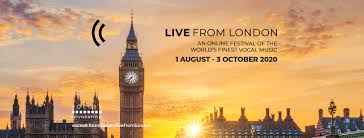
 United Kingdom VOCES8 Live from London: Academy of Ancient Music / Richard Egarr (harpsichord) with Bojan Čičić, James Toll (violins); Leo Duarte (oboe); Sarah McMahon, Joseph Crouch (cellos). VOCES8 Centre, London, 15.8.2020. (CC)
United Kingdom VOCES8 Live from London: Academy of Ancient Music / Richard Egarr (harpsichord) with Bojan Čičić, James Toll (violins); Leo Duarte (oboe); Sarah McMahon, Joseph Crouch (cellos). VOCES8 Centre, London, 15.8.2020. (CC)

Purcell – Chacony in G minor, Z 730
Bach – Keyboard Concerto No. 7 in G minor, BWV 1058 (from A minor Violin Concerto, BWV 1041); Violin Concerto in E major, BWV 1042
Vivaldi – Concerto for Two Cellos in G minor, RV 531; Concerto in A minor, Op. 3/8/RV 522 – Larghetto
Handel – Solomon: Overture (finale)
Marcello – Oboe Concerto in D minor
‘From perspiration to precipitation’: after the previous two concerts held in sub-tropical heat, the turn in the weather brought rather more comfortable conditions for the Academy of Ancient Music and Richard Egarr. Live from London brings the full experience the internet can offer, with interviews by Barnaby Smith with oboist Leo Duarte, principal viola Jane Rogers, and Egarr himself.
The concert was performed with violins to the left, and lower strings to the right. Egarr’s harpsichord was centrally placed. The choice of Purcell’s Chacony in G minor to start was a fine one, the minor mode taking us to profound regions (one could perhaps describe it as a decade-early pre-echo of Dido’s Lament: remember that Egarr programmed this piece along with Dido and Aeneas at the Barbican in October 2018). The period sound was rich, lightened perhaps a touch by Toby Carr’s theorbo contribution (the instrument positioned directly facing the centrally-placed Egarr); chromaticisms heightened the emotion at the close, before Bach’s G minor Keyboard Concerto brought us far busier textures. The church acoustic adds bloom rather than necessarily always blurring textures, and the harpsichord was caught superbly in the recording. How imaginative, too, were Egarr’s improvisations, how flexible his lines in the slow movement. The finale had huge life, not least in Egarr’s legerdemain and his ability to pinpoint the progressive side of the score.
The Concerto for Two Cellos is unique in that combination in Vivaldi’s output, performed here by the two principal cellos of the AAM. This is the first time Sarah McMahon and Joseph Crouch have performed this piece (‘really quite rock and roll’, as Crouch put it) and although they don’t intersect too often as they alternate the principal’s chair, they actually go back a while: they met at the Royal Academy of Music. The performance here was, quite rightly, abuzz with energy, perhaps because of the double treat of not only performing again but performing together. Whether together in parallel intervals or alternating solos, the overall impression was to ask, forcibly, why we so rarely hear this piece? It was a question made all the more imperative with the expressive slow movement, lachrymose in extremis (a sort of transcribed imaginary opera scena for two cellos). The clean tuning in the upper reaches of the cello was noteworthy – how easy it would be to spoil this piece – both in the fast outer movements and in that central cantilena. The whirlwind returned for the finale, gritty and vital.
The AAM’s leader, Bojan Čičić, talks about Vivaldi’s influence on Bach before playing – for his first time – Bach’s A minor Concerto in a performance of great rigour and with superb communication between soloist and ensemble (mediated by Egarr). The odd hiccup in the solo line only added to the feeling of a ‘live’ experience, and there is no doubting the expressiveness of the central Adagio, or of the sense of dialogue between soloist and tutti in the finale – but more, it was the sense of drama that impressed in this last movement.
Just one movement from the Concerto for Two Violins, RV 322, a programmed encore, in which Čičić and James Toll, leader of the seconds, created exquisite dissonances.
Nice to have part of the Overture to Solomon in a gloriously lively performance preceding Alessandro Marcello’s D minor Oboe Concerto (a concerto Bach transcribed and, in doing so, included notated ornamentation). The performance of the concerto included Leo Duarte’s own take on Bach’s ornamented version. The slow movement was in many ways the highlight of the concert, the rounded sound of the Baroque oboe ‘s ruminations perfectly placed against the slowly pulsating string background. Not without reminders of the perilous nature of original instrument performance, this remained a profound experience, brightened by the effervescence of the finale (Egarr’s audacious harpsichord descents a delight).
An encore: from Handel’s Semele, a charming ‘Where’er you walk’ with Leo Duarte taking the vocal part on oboe.
Next up, the Swingle Singers on Saturday 22 August.
Colin Clarke
For more about the VOCES8 Live from London online festival click here.
